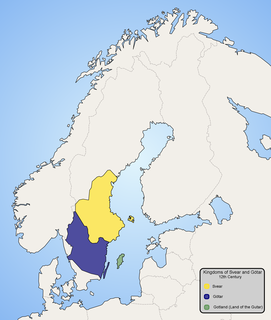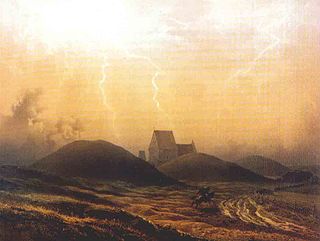
The Völsunga saga is a legendary saga, a late 13th-century poetic rendition in Old Norse of the origin and decline of the Völsung clan. It is one of the most famous legendary sagas, and an example of a "heroic saga" that deals with Germanic heroic legend.

Tyrfing, Tirfing or Tyrving was a magic sword in Norse mythology, which features in the Tyrfing Cycle, which includes a poem from the Poetic Edda called Hervararkviða, and the Hervarar saga. The name is also used in the saga to denote the Goths. The form Tervingi was actually recorded by Roman sources in the 4th century.

The Geats, sometimes called Goths, were a North Germanic tribe who inhabited Götaland in modern southern Sweden during the Middle Ages. They are one of the progenitor groups of modern Swedes, along with Swedes and Gutes. The name of the Geats also lives on in the Swedish provinces of Västergötland and Östergötland, the Western and Eastern lands of the Geats, and in many other toponyms.

Ongentheow was the name of a semi-legendary Swedish king of the house of Scylfings, who appears in Old English sources.

Hlöðskviða, known in English as The Battle of the Goths and Huns and occasionally known by its German name Hunnenschlachtlied, is an Old Norse epic poem found in Hervarar saga ok Heiðreks. Many attempts have been made to try to fit it with known history, but it is an epic poem, telescoping and fictionalising history to a large extent; some verifiable historical information from the time are place names, surviving in Old Norse forms from the period 750–850, but it was probably collected later in Västergötland.
Hervarar saga ok Heiðreks is a legendary saga from the 13th century combining matter from several older sagas in Germanic heroic legend. It tells of wars between the Goths and the Huns from the 4th century. The final part of the saga, which was likely composed separately from and later than the rest, is used as a source for Swedish medieval history.
Halfdan the Valiant was a legendary Scanian prince, who was the father of Ivar Vidfamne according to Hervarar saga, the Ynglinga saga, Njal's Saga and Hversu Noregr byggdist. The genealogical work Hversu Noregr byggdist gives his father as Harald the Old, his grandfather as Valdar and his great-grandfather as Hróarr.

Geatish kings, ruling over the provinces of Götaland (Gautland/Geatland), appear in several sources for early Swedish history. Today, most of them are not considered historical.

Hervor is the name of two female characters in the cycle of the magic sword Tyrfing, presented in Hervarar saga with parts found in the Poetic Edda. One, the viking Hervör, challenged her father Angantýr's ghost in his gravemound for his cursed sword Tyrfing, and bore Heithrek, father of the other Hervör, a commander killed in battle with her brother. The two are thought by some academics to be the same character, duplicated.
Heidrek or Heiðrekr is one of the main characters in the cycle about the magic sword Tyrfing. He appears in the Hervarar saga, and probably also in Widsith, together with his sons Angantyr (Incgentheow) and Hlöð (Hlith), and Hlöð's mother Sifka (Sifeca). The etymology is heiðr, meaning "honour", and rekr, meaning "ruler, king".
Angantyr was the name of three male characters from the same line in Norse mythology, and who appear in Hervarar saga, Gesta Danorum, and Faroese ballads.
The Tyrfing Cycle is a collection of Norse legends, unified by the shared element of the magic sword Tyrfing. Two of the legends are found in the Poetic Edda, and the Hervarar saga can be seen as a compilation of these legends.

Hlod or Hlöd was the illegitimate son of Heidrek, the king of the Geats, in Norse mythology.
Árheimar was a capital of the Goths, according to the Hervarar saga. The saga states that it was located at Danparstaðir, which is identified with the ruins of Kamjans'ke Horodyšče, near Kamianka-Dniprovska..

Gizur, Gizurr or Gissur was a King of the Geats. He appears in The Battle of the Goths and Huns, which is included in the Hervarar saga and in editions of the Poetic Edda. Gizur was the foster-father of Heidrek, who made a coup-d'état in Reidgotaland, the land of the Goths.
Skuld was a princess of Scandinavian legend who married Heoroweard and encouraged him to kill Hroðulf in Hrólfs saga kraka. The accounts of her vary greatly from source to source. Skuld is derived from the Old Norse verb skulla, "need/ought to be/shall be"; its meaning is "that which should become, or that needs to occur". Other similarly named characters appear in the Skjöldunga saga and the Gesta Danorum, as well as the Chronicon Lethrense.
Dengizich, was a Hunnic ruler and son of Attila. After Attila's death in 453 AD, his Empire crumbled and its remains were ruled by his three sons, Ellac, Dengizich and Ernak. He succeeded his older brother Ellac in 454 AD, and probably ruled simultaneously over the Huns in dual kingship with his brother Ernak, but separate divisions in separate lands.

The Legend of Sigurd and Gudrún is a book containing two narrative poems and related texts composed by J. R. R. Tolkien. It was published by Houghton Mifflin Harcourt and HarperCollins on 5 May 2009.

Angul ("Angull") was, according to Gesta Danorum, the ancestor of the Angles in Denmark.







